英语三大从句
英语三大从句

英语三大从句在英语中,主要有三大从句,即名词性从句(包括主语从句,宾语从句,表语从句,同位语从句)、形容词性从句(即定语从句)、副词性从句(即状语从句,包括时间、条件、结果、目得、原因、让步、地点、方式等)。
定语从句一、关系代词引导得定语从句关系代词代替前面得先行词,并且在定语从句中充当句子成分,可以作主语、宾语、定语等。
常见得关系代词有:who, that, which。
它们得主格、宾格与所有格如下表所示:(一)关系代词who, whom与 whose得用法who代替人,就是主格,在定语从句中作主语。
An architect is a person who designs buildings、建筑师就是设计房屋得人。
whom代替人,就是宾格,在定语从句作宾语,在非正式英语常可省略。
Do you know the gentleman whom we met in the school library yesterday? 昨天我们在学校图书馆里遇到得那位先生您认识吗?whose一般代替人,有时亦可代替物,就是所有格,在定语从句作定语。
The girl student whose father is a senior engineer used to study abroad、其父就是一位高级工程师得那个女学生过去在国外留学。
Do you know the name of the hotel whose window we can see here? 我们这儿能瞧到窗户得那个宾馆叫什么名字,您知道吗?(关系代词whose指代先行词hotel,正式用法应该用of which。
whose window=the window of which,意思就是:the window of the hotel。
)(二)关系代词which得用法which代替物,在定语从句作主语或宾语,作宾语时还可省略。
I do not like stories which have unhappy endings、我不喜欢有不幸结局得小说。
初中英语语法——三大从句汇总(重点笔记)
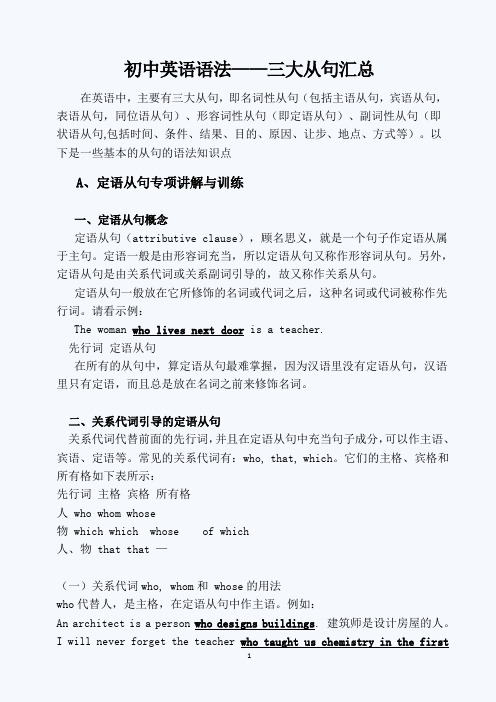
初中英语语法——三大从句汇总在英语中,主要有三大从句,即名词性从句(包括主语从句,宾语从句,表语从句,同位语从句)、形容词性从句(即定语从句)、副词性从句(即状语从句,包括时间、条件、结果、目的、原因、让步、地点、方式等)。
以下是一些基本的从句的语法知识点A、定语从句专项讲解与训练一、定语从句概念定语从句(attributive clause),顾名思义,就是一个句子作定语从属于主句。
定语一般是由形容词充当,所以定语从句又称作形容词从句。
另外,定语从句是由关系代词或关系副词引导的,故又称作关系从句。
定语从句一般放在它所修饰的名词或代词之后,这种名词或代词被称作先行词。
请看示例:The woman who lives next door is a teacher.先行词定语从句在所有的从句中,算定语从句最难掌握,因为汉语里没有定语从句,汉语里只有定语,而且总是放在名词之前来修饰名词。
二、关系代词引导的定语从句关系代词代替前面的先行词,并且在定语从句中充当句子成分,可以作主语、宾语、定语等。
常见的关系代词有:who, that, which。
它们的主格、宾格和所有格如下表所示:先行词主格宾格所有格人 who whom whose物 which which whose of which人、物 that that —(一)关系代词who, whom和 whose的用法who代替人,是主格,在定语从句中作主语。
例如:An architect is a person who designs buildings. 建筑师是设计房屋的人。
I will never forget the teacher who taught us chemistry in the firstyear of my senior middle school.我将永远不会忘记在高一时教我们化学的那位老师。
Anyone who wants to apply for this job must send us the resume by email first. 想应聘这个职位的任何人都必须先通过电子邮件向我们发送简历。
英语三大从句类型总结
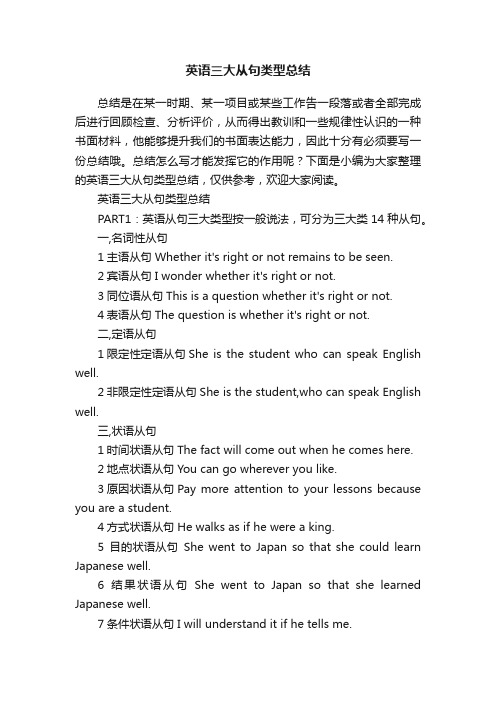
英语三大从句类型总结总结是在某一时期、某一项目或某些工作告一段落或者全部完成后进行回顾检查、分析评价,从而得出教训和一些规律性认识的一种书面材料,他能够提升我们的书面表达能力,因此十分有必须要写一份总结哦。
总结怎么写才能发挥它的作用呢?下面是小编为大家整理的英语三大从句类型总结,仅供参考,欢迎大家阅读。
英语三大从句类型总结PART1:英语从句三大类型按一般说法,可分为三大类14种从句。
一,名词性从句1主语从句Whether it's right or not remains to be seen.2宾语从句I wonder whether it's right or not.3同位语从句This is a question whether it's right or not.4表语从句The question is whether it's right or not.二,定语从句1限定性定语从句She is the student who can speak English well.2非限定性定语从句She is the student,who can speak English well.三,状语从句1时间状语从句The fact will come out when he comes here.2地点状语从句You can go wherever you like.3原因状语从句Pay more attention to your lessons because you are a student.4方式状语从句He walks as if he were a king.5目的状语从句She went to Japan so that she could learn Japanese well.6结果状语从句She went to Japan so that she learned Japanese well.7条件状语从句I will understand it if he tells me.8让步状语从句He knows a lot though he is little.PART2:经典名词性从句主语从句(subject clauses)在复合句中起主语作用的从句叫主语从句。
(完整)高中英语主要要掌握三大从句

高中英语主要要掌握三大从句。
分别是:1、定语从句(形容词从句)2、名词词从句(包括主语从句,宾语从句,表语从句,同位语从句)3、状语从句(副词性从句,包括时间,地点,结果,目的,原因等)一、定语从句:定语从句(Attributive Clauses)在句中做定语,修饰一个名词或代词,被修饰的名词,词组或代词即先行词。
定语从句通常出现在先行词之后,由关系词(关系代词或关系副词)引出。
1、关系代词引导的定语从句关系代词所代替的先行词是人或物的名词或代词,并在从句中充当主语、宾语、定语等成分。
关系代词在定语从句中作主词保持一致。
(1), who, whom, that这些词代替指人,“whom”作宾语指人,“that”既可作主语又可作宾语(作宾语可以省略),可以指人也可以指物。
(2),Which 用来指人或物(用作主语、宾语,作宾语时可以省略)(3),whose“whose”表示谁(可以为人也可以为物)的(东西)2、关系代词引导的定语从句(1),关系副词why主要用于修饰表示原因的名词(主要是the reason),同时它在定语从句中用作原因状语。
(2),关系副词when主要用于修饰表示时间的名词,同时它在定语从句中用作时间状语。
(3),关系副词where主要用于修饰表示地点的名词,同时它在定语从句中用作地点状语。
3、非限制性定语从句它起补充说明作用,缺少也不会影响全句的理解。
在非限制性定语从句的前面往往有逗号隔开。
二、名词性从句在句子中起名词作用的句子叫名词性从句(Noun Clauses)。
名词性从句的功能相当于名词词组, 它在复合句中能担任主语、宾语、表语、同位语、介词宾语等,因此根据它在句中不同的语法功能,名词性从句又可分别称为主语从句、宾语从句、表语从句和同位语从句。
引导名词性从句的连接词可分为三类:1、连词(5个):that (宾语从句或表语从句中that有时可以省略)whether,if (均表示“是否”表明从句内容的不确定性)as if ,as though (均表示“好像”,“似乎”)以上在从句中均不充当任何成分2、连接代词(9个):what, whatever, who, whoever, whom, whomever, whose, which, whichever3、连接副词(7个):when, where, how, why, whenever, wherever, however三、状语从句状语从句(Adverbial Clause)状语从句指句子用作状语时,起副词作用的句子。
英语 中三大类从句

限制性定语从句和非限制性定语从句
⑴限制性定语从句起修饰、限定或确定的作用,同先行词的 关系十分密切,是先行词不可缺少的定语。如果将从句去 掉,主句的意思就不完整,甚至不合乎逻辑。常翻译成带 “的”字的定语性词组。如:
The boys who are planting trees on the hill are middle school students. 在山上种树的男孩都是中学生。
关系代词的用法(一)
⑴who 指人,是主格,在从句中作主语。如: Do you know the boy who is standing under the tree? He is one of the students who have been to Beijing. He is the only one of the students who has been to Beijing. 注:关系代词在从句中作主语时,其人称和数要与其先行词一致。
连接词的用法 (二)
2. whether 和 if 连词whether和 if表“是否”之意,在 从句中不可省略。 在下列情况中只用whether不用if: ⑴ 引导主语从句、表语从句和同位语从句时; The question is whether it is worth trying. Whether she comes or not makes no difference. I have no idea whether I should believe him or not. ⑵ 从句作介词的宾语时; Ryan was worrying about whether he had hurt her feelings. ⑶ or not紧随其后时;I don’t care whether or not he has a holiday. ⑷ 后接不定式时。 She can’t decide whether to go.
英语三大从句
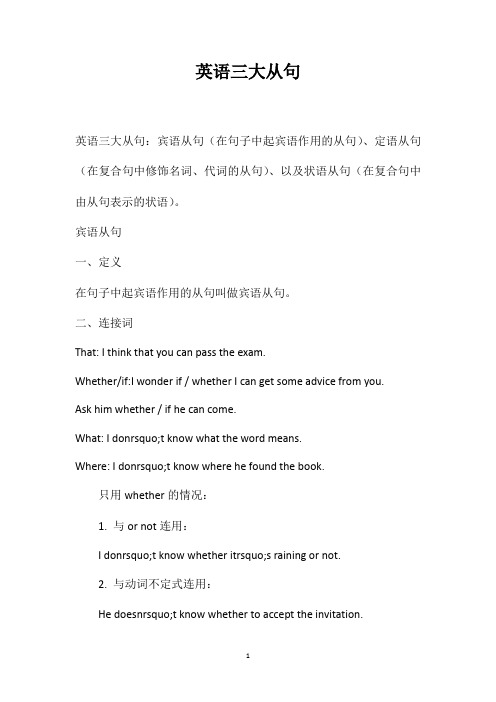
英语三大从句英语三大从句:宾语从句(在句子中起宾语作用的从句)、定语从句(在复合句中修饰名词、代词的从句)、以及状语从句(在复合句中由从句表示的状语)。
宾语从句一、定义在句子中起宾语作用的从句叫做宾语从句。
二、连接词That: I think that you can pass the exam.Whether/if:I wonder if / whether I can get some advice from you.Ask him whether / if he can come.What: I donrsquo;t know what the word means.Where: I donrsquo;t know where he found the book.只用whether的情况:1. 与or not连用:I donrsquo;t know whether itrsquo;s raining or not.2. 与动词不定式连用:He doesnrsquo;t know whether to accept the invitation.3. 连接词前有介词时:It depends on whether he is coming.三、时态1. 主句是一般现在时态,从句根据实际情况而定(各种时态均可)She wants to know what he has done for the exam.2.主句是一般过去时态,从句用相应的过去的时态。
1)She said that she was a student.2)She said that she would fly to Japan in a week.3)She said that she had finished her homework already.3. 如果宾语从句说的是客观真理、自然现象或事实时,这时宾语从句要用一般现在时态。
高中英语主要要掌握三大从句
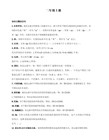
关系代词所代替的先行词是人或物的名词或代词,并在从句中充当主语、宾语、定语等成分。关系代词在定语从句中作主词保持一致。
(1), who, whom, that
这些词代替指人,“whom”作宾语指人,“that”既可作主语又可作宾语(作宾语可以省略),可以指人也可以指物。
引导名词性从句的连接词可分为三类:
1、连词(5个):that (宾语从句或表语从句中that有时可以省略) whether,if (均表示“是否”表明从句内容的不确定性)
as if ,as t
2、连接代词(9个):what, whatever, who, whoever, whom, whomever, whose, which, whichever
高中英语主要要掌握三大从句。
分别是:
1、定语从句(形容词从句)
2、名词词从句(包括主语从句,宾语从句,表语从句,同位语从句)
3、状语从句(副词性从句,包括时间,地点,结果,目的,原因等)
一、定语从句:
定语从句(Attributive Clauses)在句中做定语,修饰一个名词或代词,被修饰的名词,词组或代词即先行词。定语从句通常出现在先行词之后,由关系词(关系代词或关系副词)引出。
(3),关系副词where主要用于修饰表示地点的名词,同时它在定语从句中用作地点状语。
3、非限制性定语从句
它起补充说明作用,缺少也不会影响全句的理解。在非限制性定语从句的前面往往有逗号隔开。
二、名词性从句
在句子中起名词作用的句子叫名词性从句 (Noun Clauses)。 名词性从句的功能相当于名词词组, 它在复合句中能担任主语、宾语、表语、同位语、介词宾语等,因此根据它在句中不同的语法功能,名词性从句又可分别称为主语从句、宾语从句、表语从句和同位语从句。
英语三大从句的连接词

英语三大从句:名词从句(主语从句、宾语从句、表语从句和同位语从句)、定语从句、状语从句一、引导名词从句的连词从属连词that(可用于所有名词从句,一般可省略)、是否whether,if;疑问连词what, which, who/whom/whose;疑问副词when, where, why, how ——带特殊疑问句,陈述句语序(主+谓)、带不定式复合关系代词whatever, whoever, whomever, whichever, whenever, wherever, however——无论……二、定语从句引导词关系代词:人who (whom whose[后带名词]);事物which(必须的两种情况:有逗号,有介词)、that、as (such… as…,the same as…, 或者如…:与know, see, report, expect, hear,think, hope, wish, like, want, need 等词连用,一般在句首或者做插入语);关系副词when, where, why ——相当于介词+ which关系形容词whose[后带名词]三、带状语从句的连接词:because[biˈkɔz; (uS) biˈkɔːz] conj. 因为as[əz, æz] ad.& conj.像……一样;如同;因为prep. 作为,当做since [sins]ad. 从那时以来conj. 从…以来,…以后,由于prep. 从…以来for [fə(r), fɔː(r)] prep. 为了…;向…,往…;与…交换;防备…;适合…;因为…;在…期间;对于…;对…来说conj. 因为,由于so [səʊ]ad. 如此,这么;非常;同样conj. 因此,所以so that 以便;所以so…that…such… that…now that 既然;由于in order thatConsidering考虑到(一般在句首)Given 考虑到,鉴于(一般在句首)after[ˈɑːftə(r)]r ad. 在后;后来prep. 在…之后;在后面conj. 在…以后before[biˈfɔː(r)] prep. 在…以前;在…前面ad. 以前conj. 在…之前till [til] conj.& prep.直到,直到…为止until [ʌnˈtil] prep.& conj.直到…为止once [wʌns]n& ad. 一次,一度,从前conj. 一旦while [wail; (uS) hwail] conj.在…的时候,和…同时n 一会儿,一段时间when [wen] conj. 当…的时候ad. 什么时候,何时but [bət, bʌt] conj. 但是,可是prep. 除了, 除……外whatever [wɔtˈevə(r)] conj. & pron无论什么,不管什么however [haʊˈevə(r)] ad. 可是conj. 然而,可是,尽管如此whenever [wenˈevə(r)] conj. 每当,无论何时wherever [weərˈevə(r)] conj. 无论在哪里although[ɔːlˈðəʊ] conj. 虽然,尽管though[ðəʊ] conj. 虽然,可是even though 虽然,即使unless [ʌnˈles] conj. 如果不,除非or [ə(r), ɔː(r)] conj. 或;就是;否则that[ðæt] a.& pron那,那个conj. 那,那个(引导宾语从句等)ad. 那么,那样whether [ˈweðə(r); (uS) ˈhweðər] conj. 是否if [if] conj.如果,假使,是否,是不是provided that 如果;条件是(一般在句首)assuming that 假定…(一般在句首)or [ə(r), ɔː(r)] conj. 或;就是;否则either [ˈaiðə(r)] a. 两方任一方的;二者之一conj. 二者之一;要么……nor[nɔː(r)] conj. 也不neither conj. 也不;既不and[ænd] conj. 和;又;而[ənd,]than[ðen, ðæn] conj. 比even if 即使;虽然as if 犹如,好似as long as 只要;和…一样长so long as 只要英文连接词像胶水一样将相关联的句子连接起来,所以又被称为“胶水词”,胶水词就像英语的骨架一样重要,学会了胶水词,同时拥有词组的累积,你就可以轻松灵活的造出任何需要的长句,让你的英文交流如鱼得水。
初中英语必会三大从句讲解
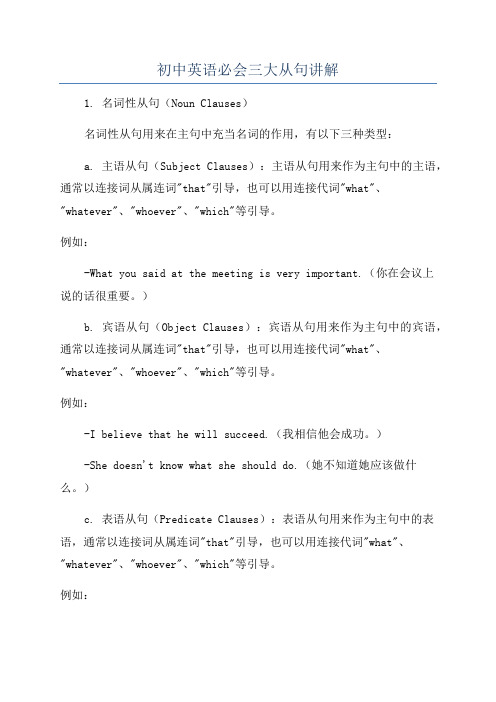
初中英语必会三大从句讲解1. 名词性从句(Noun Clauses)名词性从句用来在主句中充当名词的作用,有以下三种类型:a. 主语从句(Subject Clauses):主语从句用来作为主句中的主语,通常以连接词从属连词"that"引导,也可以用连接代词"what"、"whatever"、"whoever"、"which"等引导。
例如:-What you said at the meeting is very important.(你在会议上说的话很重要。
)b. 宾语从句(Object Clauses):宾语从句用来作为主句中的宾语,通常以连接词从属连词"that"引导,也可以用连接代词"what"、"whatever"、"whoever"、"which"等引导。
例如:-I believe that he will succeed.(我相信他会成功。
)-She doesn't know what she should do.(她不知道她应该做什么。
)c. 表语从句(Predicate Clauses):表语从句用来作为主句中的表语,通常以连接词从属连词"that"引导,也可以用连接代词"what"、"whatever"、"whoever"、"which"等引导。
例如:-Her dream is that she can travel around the world.(她的梦想是能够周游世界。
)2. 定语从句(Adjective Clauses)定语从句用来修饰或限制名词或代词,通常以关系代词"who"、"whom"、"which"、"whose"、"that"等引导。
英语三大从句

英语三大从句LELE was finally revised on the morning of December 16, 2020复合句【语法要点】复合句是由一个主句加一个或几个从句所构成的句子。
从句只用作句子的一个成分,不能独立。
根据从句在句子中的作用,可分为名词性从句、定语从句和状语从句三类。
(一)名词性从句名词性从句包括主语从句、表语从句、宾语从句、同位语从句。
其关联词有连接词that、if、whether;疑问代词who、what、which和疑问副词when、where、how、why等。
1)if不能引导表语从句。
连接代词who、what、whose、which不能引导同位语从句。
2)有时as、as if/though、because也可以引导表语从句,能跟表语从句的谓语动词一般为系动词be、seem、look等。
例如:Things are not always as they seem to be.事情并不总是像表面上看来的那样。
It looks as if it were going to rain. It is because you eat too much.3)介词宾语不可以用which来引导,而要用what来引导。
例如:We can learn what we did not know. He will talk to us about what he saw in the .4)连词that引导的名词性从句除能用在except、but、in后之外很少作介词的宾语,。
其它一些介词的宾语从句如果由连词that引导,则需用it先行一步作形式宾语。
例如:He is a good student except that he is careless.You may depend on it that they will support you.5)若主句谓语动词是及物动词make、find、think、see、hear等,则把宾语从句置于宾语补足语之后,用it作形式宾语。
英语中的三大从句汇总
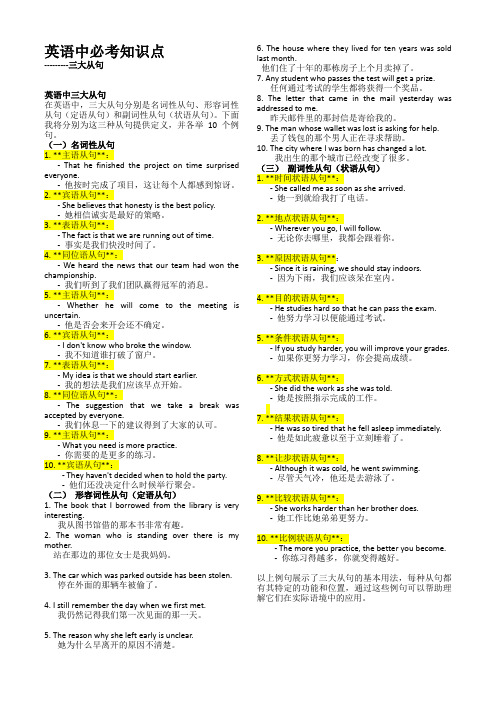
英语中必考知识点---------三大从句英语中三大从句在英语中,三大从句分别是名词性从句、形容词性从句(定语从句)和副词性从句(状语从句)。
下面我将分别为这三种从句提供定义,并各举10个例句。
(一)名词性从句1. **主语从句**:- That he finished the project on time surprised everyone.- 他按时完成了项目,这让每个人都感到惊讶。
2. **宾语从句**:- She believes that honesty is the best policy.- 她相信诚实是最好的策略。
3. **表语从句**:- The fact is that we are running out of time.- 事实是我们快没时间了。
4. **同位语从句**:- We heard the news that our team had won the championship.- 我们听到了我们团队赢得冠军的消息。
5. **主语从句**:- Whether he will come to the meeting is uncertain.- 他是否会来开会还不确定。
6. **宾语从句**:- I don't know who broke the window.- 我不知道谁打破了窗户。
7. **表语从句**:- My idea is that we should start earlier.- 我的想法是我们应该早点开始。
8. **同位语从句**:- The suggestion that we take a break was accepted by everyone.- 我们休息一下的建议得到了大家的认可。
9. **主语从句**:- What you need is more practice.- 你需要的是更多的练习。
10. **宾语从句**:- They haven't decided when to hold the party.- 他们还没决定什么时候举行聚会。
英语三大从句语法讲解

英语三大从句语法讲解 Document number:PBGCG-0857-BTDO-0089-PTT1998英语三大从句在英语中,主要有三大从句,即名词性从句(包括主语从句,宾语从句,表语从句,同位语从句)、形容词性从句(即定语从句)、副词性从句(即状语从句,包括时间、条件、结果、目的、原因、让步、地点、方式等)。
定语从句一、关系代词引导的定语从句关系代词代替前面的先行词,并且在定语从句中充当句子成分,可以作主语、宾语、定语等。
常见的关系代词有:who, that, which。
它们的主格、宾格和所有格如下表所示:(一)关系代词who, whom和 whose的用法who代替人,是主格,在定语从句中作主语。
An architect is a person who designs buildings. 建筑师是设计房屋的人。
whom代替人,是宾格,在定语从句作宾语,在非正式英语常可省略。
Do you know the gentleman whom we met in the school library yesterday 昨天我们在学校图书馆里遇到的那位先生你认识吗whose一般代替人,有时亦可代替物,是所有格,在定语从句作定语。
The girl student whose father is a senior engineer used to study abroad. 其父是一位高级工程师的那个女学生过去在国外留学。
Do you know the name of the hotel whose window we can see here 我们这儿能看到窗户的那个宾馆叫什么名字,你知道吗(关系代词whose指代先行词hotel,正式用法应该用of which。
whose window=the window of which,意思是:the window of the hotel。
)(二)关系代词which的用法which代替物,在定语从句作主语或宾语,作宾语时还可省略。
英语三大从句

英语三大从句 Prepared on 22 November 2020英语三大从句在英语中,主要有三大从句,即名词性从句(包括主语从句,宾语从句,表语从句,同位语从句)、形容词性从句(即定语从句)、副词性从句(即状语从句,包括时间、条件、结果、目的、原因、让步、地点、方式等)。
定语从句一、关系代词引导的定语从句关系代词代替前面的先行词,并且在定语从句中充当句子成分,可以作主语、宾语、定语等。
常见的关系代词有:who, that, which。
它们的主格、宾格和所有格如下表所示:(一)关系代词who, whom和 whose的用法who代替人,是主格,在定语从句中作主语。
An architect is a person who designs buildings. 建筑师是设计房屋的人。
whom代替人,是宾格,在定语从句作宾语,在非正式英语常可省略。
Do you know the gentleman whom we met in the school library yesterday 昨天我们在学校图书馆里遇到的那位先生你认识吗whose一般代替人,有时亦可代替物,是所有格,在定语从句作定语。
The girl student whose father is a senior engineer used to study abroad. 其父是一位高级工程师的那个女学生过去在国外留学。
Do you know the name of the hotel whose window we can see here 我们这儿能看到窗户的那个宾馆叫什么名字,你知道吗(关系代词whose指代先行词hotel,正式用法应该用of which。
whose window=the window of which,意思是:the window of the hotel。
)(二)关系代词which的用法which代替物,在定语从句作主语或宾语,作宾语时还可省略。
英语 三大从句

英语三大从句三大从句包括名词性从句、形容词性从句和副词性从句。
名词性从句 (Noun Clause):英文:A noun clause is a type of dependent clause that functions as a noun within a sentence. It can act as the subject, object, or complement of the main clause.中文:名词性从句是一种在句子中起名词作用的从属从句。
它可以充当主句的主语、宾语或补语。
形容词性从句 (Adjective Clause):英文:An adjective clause is a dependent clause that describes or gives more information about a noun in the main clause. It usually begins with a relative pronoun (such as who, which, that) or a relative adverb (such as when, where, why).中文:形容词性从句是一个描述或提供更多信息关于主句中名词的从属从句。
它通常以关系代词(如who, which, that)或关系副词(如when, where, why)开头。
副词性从句 (Adverbial Clause):英文:An adverbial clause is a dependent clause that functions as an adverb in the sentence. It provides information about the time, place, manner, reason, orcondition of the action in the main clause.中文:副词性从句是一个在句子中起副词作用的从属从句。
英语三大从句

③在不定式 to do 前 e.g: I don’t know whether to do it. ④ 在谓语动词discuss的后面
3) 特殊疑问词 分两类:疑问副词和疑问代词。①疑问副词只能做状语
2、 定语从句的定义:在复合句中作定语的句子叫做定语从句,定语从句的作用是修饰前面的先行词或主句
其他成分。
I have a sister. She is a student.
请把这两个简单句改成包含定语从句的复合句。 I have a sister who is a student.
定语从句的关系词分类:
B 3.--- Hi, Alice. I wonder ________ . -- I often go swimming in the sports center.
A.where you skate
B.what you do on the weekend
C.when you exercise
D.whether you enjoy your weekend
Whether you want to go or not, you have to go.
4)“no matter➕疑问词”,或“疑问词➕ever”,表示“无论…” ★Exercises 翻译: 1.无论你去哪里,无论你做什么,我都会在这里等你。 Wherever you go ,whatever you do,I will be right here waiting for you.(摘自歌 曲Right Here Waiting) (转为同义句) No matter where you go,no matter what you do,I will be right here waiting for you.
初中英语语法三大从句汇总
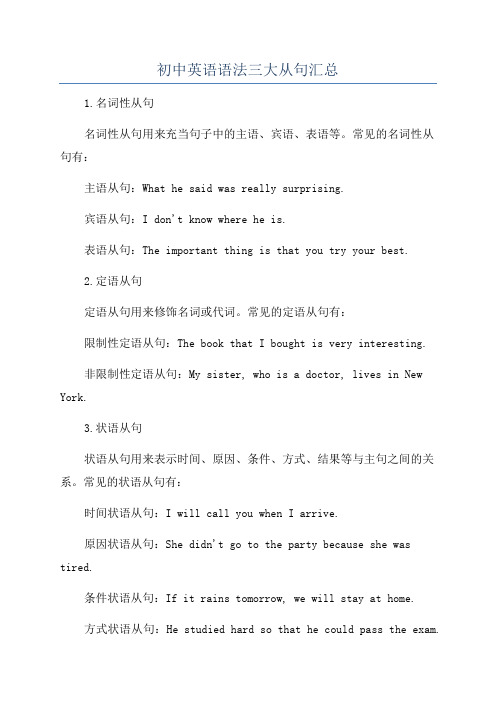
初中英语语法三大从句汇总
1.名词性从句
名词性从句用来充当句子中的主语、宾语、表语等。
常见的名词性从句有:
主语从句:What he said was really surprising.
宾语从句:I don't know where he is.
表语从句:The important thing is that you try your best.
2.定语从句
定语从句用来修饰名词或代词。
常见的定语从句有:
限制性定语从句:The book that I bought is very interesting.
非限制性定语从句:My sister, who is a doctor, lives in New York.
3.状语从句
状语从句用来表示时间、原因、条件、方式、结果等与主句之间的关系。
常见的状语从句有:
时间状语从句:I will call you when I arrive.
原因状语从句:She didn't go to the party because she was tired.
条件状语从句:If it rains tomorrow, we will stay at home.
方式状语从句:He studied hard so that he could pass the exam.
结果状语从句:She was so tired that she couldn't walk.。
高考英语三大从句

高考英语三大从句一、名词性从句1.当从句的结构与意义都完整,说话人语气坚定用that,有疑问用whether/if。
2.当从句的结构完整,意义不完整,缺状语用where,when,why,how, 缺定语用whose或which。
3.当从句的结构不完整,缺主宾表,说事用what,说人用who, whom。
二、形容词性从句(定语从句)1.当从句的结构不完整,缺主宾表,说事用that /which,说人用that/who/whom.2.当从句的结构完整,意义不完整,缺状语用where(in/on+which),when(in/on/at/during+which),why(for+which).3.当从句的结构不完整,缺定语用whose(=of which/whom +the+n. = the+n.+of which/whom)三、副容词性从句(状语从句)时间状语 when, whenever, while, as, before, after, until, till, by the time, as soon as, hardly…when, no sooner…than, the moment, the second, the minute, immediately, directly, instantly地点状语 where, wherever原因状语 because, as, since, now that条件状语 if, unless, once, in case, as long as, on condition that目的状语 so that, in order that, for fear that结果状语 so…that, such…that比较状语 than, as…as, not so/as…as, the more…the more方式状语 as if, as though, as让步状语 though, although, even if, even though, as, no matter what, whatever, no matter who, whoever, no matter which, whichever, no matter how, however, no matter when, whenever。
一个句子搞定英语的三大从句
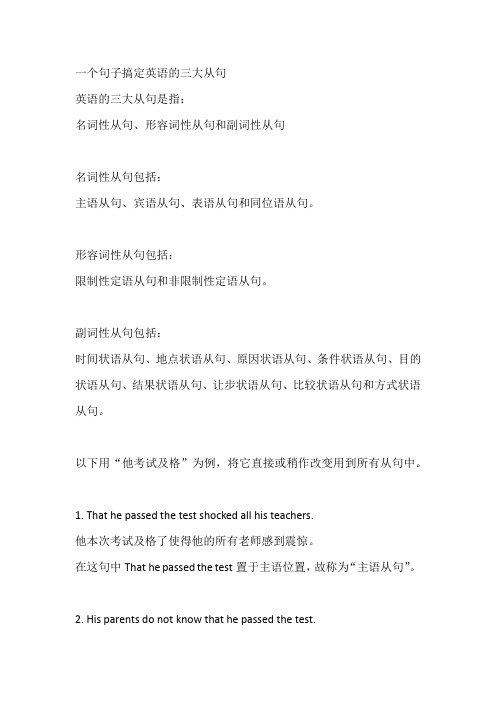
一个句子搞定英语的三大从句英语的三大从句是指:名词性从句、形容词性从句和副词性从句名词性从句包括:主语从句、宾语从句、表语从句和同位语从句。
形容词性从句包括:限制性定语从句和非限制性定语从句。
副词性从句包括:时间状语从句、地点状语从句、原因状语从句、条件状语从句、目的状语从句、结果状语从句、让步状语从句、比较状语从句和方式状语从句。
以下用“他考试及格”为例,将它直接或稍作改变用到所有从句中。
1.That he passed the test shocked all his teachers.他本次考试及格了使得他的所有老师感到震惊。
在这句中That he passed the test置于主语位置,故称为“主语从句”。
2. His parents do not know that he passed the test.他的父母不知道他本次考试及格了。
在这句中that he passed the test置于宾语位置,故称为“宾语从句”。
3. He looks happy. The reason is that he passed the test.他看上去很开心,理由是他本次考试及格了。
在这句中that he passed the test置于表语位置,故称为“表语从句”。
4. The fact that he passed the test shocked all his teachers.他本次考及格了这一事实让他的老师感到震惊。
在这句中that he passed the test置于同位语位置,故称为“同位语从句”。
除了用that引导,还可以根据具体的意思不同,用其它引导词引导。
例如:5.How he passed the test is still unknown to me.(主语从句)这次考试他是如何及格的我还不知道。
6. I don't know how he passed the test.(宾语从句)我不知道他这次考试如何及格的。
高中英语三大从句解释

1、定语从句(形容词从句)2、名词词从句(包括主语从句,宾语从句,表语从句,同位语从句)3、状语从句(副词性从句,包括时间,地点,结果,目的,原因等)一、定语从句:定语从句(Attributive Clauses)在句中做定语,修饰一个名词或代词,被修饰的名词,词组或代词即先行词。
定语从句通常出现在先行词之后,由关系词(关系代词或关系副词)引出。
1、关系代词引导的定语从句关系代词所代替的先行词是人或物的名词或代词,并在从句中充当主语、宾语、定语等成分。
关系代词在定语从句中作主词保持一致。
(1), who, whom, that这些词代替指人,“whom”作宾语指人,“that”既可作主语又可作宾语(作宾语可以省略),可以指人也可以指物。
(2),Which 用来指人或物(用作主语、宾语,作宾语时可以省略)(3),whose“whose”表示谁(可以为人也可以为物)的(东西)2、关系代词引导的定语从句(1),关系副词why主要用于修饰表示原因的名词(主要是the reason),同时它在定语从句中用作原因状语。
(2),关系副词when主要用于修饰表示时间的名词,同时它在定语从句中用作时间状语。
(3),关系副词where主要用于修饰表示地点的名词,同时它在定语从句中用作地点状语。
3、非限制性定语从句它起补充说明作用,缺少也不会影响全句的理解。
在非限制性定语从句的前面往往有逗号隔开。
二、名词性从句在句子中起名词作用的句子叫名词性从句(Noun Clauses)。
名词性从句的功能相当于名词词组, 它在复合句中能担任主语、宾语、表语、同位语、介词宾语等,因此根据它在句中不同的语法功能,名词性从句又可分别称为主语从句、宾语从句、表语从句和同位语从句。
引导名词性从句的连接词可分为三类:1、连词(5个):that (宾语从句或表语从句中that有时可以省略)whether,if (均表示“是否”表明从句内容的不确定性)as if ,as though (均表示“好像”,“似乎”)以上在从句中均不充当任何成分2、连接代词(9个):what, whatever, who, whoever, whom, whomever, whose, which, whichever3、连接副词(7个):when, where, how, why, whenever, wherever, however三、状语从句状语从句(Adverbial Clause)状语从句指句子用作状语时,起副词作用的句子。
- 1、下载文档前请自行甄别文档内容的完整性,平台不提供额外的编辑、内容补充、找答案等附加服务。
- 2、"仅部分预览"的文档,不可在线预览部分如存在完整性等问题,可反馈申请退款(可完整预览的文档不适用该条件!)。
- 3、如文档侵犯您的权益,请联系客服反馈,我们会尽快为您处理(人工客服工作时间:9:00-18:30)。
复合句【语法要点】复合句是由一个主句加一个或几个从句所构成的句子。
从句只用作句子的一个成分,不能独立。
根据从句在句子中的作用,可分为名词性从句、定语从句和状语从句三类。
(一)名词性从句名词性从句包括主语从句、表语从句、宾语从句、同位语从句。
其关联词有连接词that、if、whether;疑问代词who、what、which和疑问副词when、where、how、why等。
1.名词性从句句法结构:2.名词性从句的其它用法:1)if不能引导表语从句。
连接代词who、what、whose、which不能引导同位语从句。
2)有时as、as if/though、because也可以引导表语从句,能跟表语从句的谓语动词一般为系动词be、seem、look等。
例如:Things are not always as they seem to be.事情并不总是像表面上看来的那样。
It looks as if it were going to rain. It is because you eat too much.3)介词宾语不可以用which来引导,而要用what来引导。
例如:We can learn what we did not know. He will talk to us about what he saw in the .4)连词that引导的名词性从句除能用在except、but、in后之外很少作介词的宾语,。
其它一些介词的宾语从句如果由连词that引导,则需用it先行一步作形式宾语。
例如:He is a good student except that he is careless.You may depend on it that they will support you.5)若主句谓语动词是及物动词make、find、think、see、hear等,则把宾语从句置于宾语补足语之后,用it作形式宾语。
例如:We find it necessary that we practise spoken-English every day.6)某些作表语的形容词或过去分词后常接宾语从句,如sure、happy、glad、certain、pleased、afraid、surprised、satisfied等,连词that可省略,有的语法书称之为状语从句。
例如:I am sure that he will succeed.I am afraid you don’t understand what I said.Mother was very pleased her daughter had passed the exams.7)连接代词whoever、whatever、whichever也可引导宾语从句。
例如:I will show you whatever you want to see.You may choose whoever you like. I will take whichever fits the sockets.(插座)8)同位语从句一般跟在某些表示抽象概念的名词后面,用以说明名词所表示的具体内容。
常跟同位语从句的名词主要有:idea、news、fact、promise、answer、belief、condition、doubt、fear、hope、order、problem、proof、question、reply、report、suggestion、thought、 truth等。
由连词that引导同位语从句既无语法功能,也无词汇意义,只是引导词;由连词whether引导同位语从句无语法功能,但有词汇意义“是否”;由连词when、where、how引导同位语从句在句中分别作作时间、地点和方式状语。
注意→①关联词只能用whether不能用if表示“是否”的情况如下:A)在表语从句和同位语从句中。
例如:The question is whether the film is worth seeing.The news whether our team has won the match is unknown.B)在主语从句中,只有it作形式主语时whether和if均可。
否则,也只能用whether。
例如:Whether we shall attend the meeting hasn’t been decided yet.It hasn’t been decided whether/if we shall attend the meeting.C)在介词之后(介词往往可以省略)。
例如:It all depends (on) whether they will support us.D)后面直接跟动词不定式时。
例如:He doesn’t know whether to stay or not.E)与or not连用时。
例如:We didn’t know whether or not she was ready.②关联词if、whether均可使用的情况如下:A)引导宾语从句,但当宾语从句是否定句时,一般用if引导。
例如:I wonder if/whether the news is true or not. I don’t care if it doesn’t rain.B)在“be+形容词”之后。
例如:He was not sure whether/if it is right or wrong.③用if引导宾语从句如果会引起歧义,应避免使用if而用whether。
试比较:Please let me know if you want to go. Please let me know whether you want to go.(if从句既可理解为宾语从句,也可理解为条件状语从句)doubt作“怀疑”解接宾语从句时,主句为肯定句用whether或if,主句为否定句或疑问句用that。
10)it作形式主语①that所引导的主语从句常由代词it作形式主语。
且wh-系列引导词引导的从句均可。
例如:It makes everyone happy that the girl is still alive.It doesn’t matter too much whether he’s coming or not.It is still open to question who is to head the group. 谁领导这个小组还没定下来。
②常以it作形式主语的句型有:—It +be+形容词(obvious、true、natural、surprising、good、wonderful、funny、possible、likely、certain、probable)+that从句—It +be+名词词组(no wonder、an honour、a good thing、a pity、no surprise)+that从句—It +be+过去分词(said、reported、thought、expected、decided、announced、arranged)+that 从句—It +seem、happen等不及物动词及短语+that从句—It +doesn’t matter(makes no difference, etc)+连接代词或连接副词引导的主语从句—当that引导的主语从句出现在疑问句中时,也要以it作形式主语,而把主语从句后置。
例如:Is it true that the scientist will give us a lecture next week(二)定语从句在复合句中修饰名词或代词的从句叫定语从句。
被修饰的名词或代词叫先行词。
引导定语从句的关系代词有who、whom、whose、which、that等和关系副词where、when、why等。
关系代词和关系副词在定语从句中担任句子成分。
而引导引导非限定性定语从句的关系代词有who、whom、whose、which、of which等,这些关系代词都不能省略,通常不用关系代词that。
例如:I have two sisters, who are both students.例如:This is the man who helped me. They have a dog whose barking drives me mad.I know the reason why he came late. This is the place where we lived for 5 years.I will never forger the day when I met Mr. Liu.The doctor whom you are looking for is in the room.注意→先行词表示地点时,有时用where,有时用that引导定语从句。
这时要根据从句的谓语动词是及物的还是不及物的,是及物的就用that(which),否则就用where。
例如;This is the house where he lived last year.This is the house that (which) he visited last year.关系代词which、who或that在限定性定语从句中作宾语时可省略。
例如:Amsterdam is the place we like most.They are looking for a person (who) they can rely on.在定语从句中,若先行词指人,其关系代词可用who、whom,也可用that。
例如:The girl who/that is speaking at the meeting is our monitor.在下列情况下多用或须用who。
①关系代词在从句中作主语时。
例如:The doctor who treated me was very experienced. 给我治病的医生是很有经验的。
②先行词为all、anyone、one、ones、those、people等时。
例如:All who heard the news were excited. 所有听到这消息的人都感到兴奋。
Those who want to go please sign their names here. 想去的人请在这里签名。
④在非限制性定语从句中。
例如:Tom’s father, who is over sixty, still works hard.⑤在被分隔的定语从句中。
